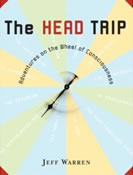Take a trip through the science – and experience – of altered states of consciousness in Jeff Warren’s absorbing new book: The Head Trip.
Sleep is one of the most fascinating altered states of consciousness in which we spend a third of our lives. It’s also the area that has the most research findings and it’s where Jeff Warren starts his fascinating journey around what he calls the ‘wheel of consciousness’.












